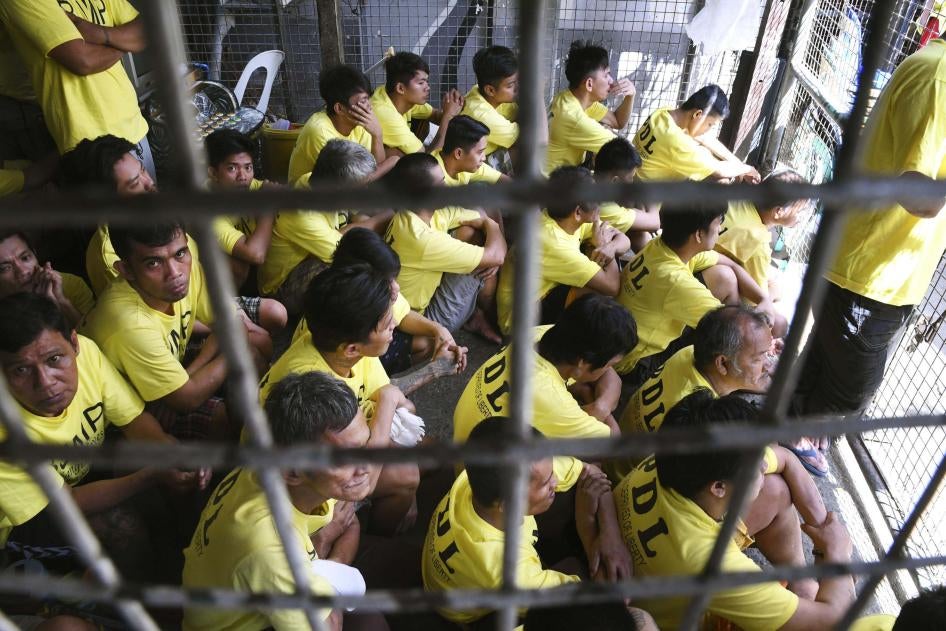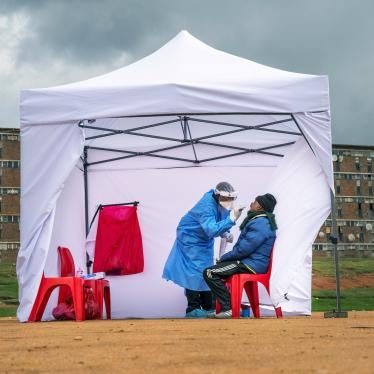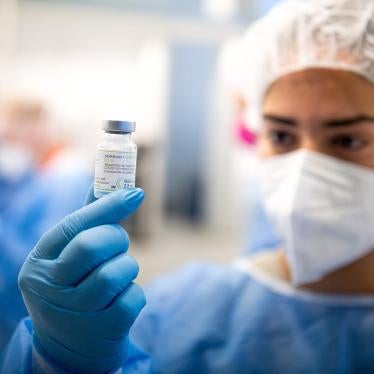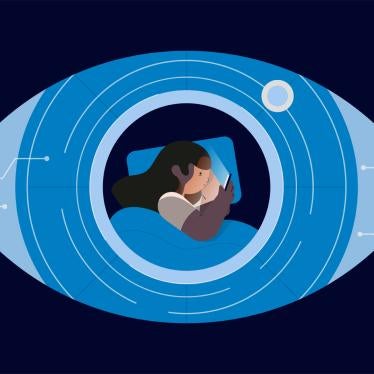(New York) – Governments are releasing from jails and prisons far too few people whose continued detention in the context of the Covid-19 pandemic is not justified, Human Rights Watch said today, based on a global media survey. Available data indicates that the virus is spreading rapidly through jails and prisons, putting detainees, staff, and their families at unacceptable risk.
Globally, abusive laws that criminalize non-criminal conduct and policies that prioritize incarceration, including pretrial detention, have led to an unacceptably large global prison population estimated at 11 million. Media, government, and other reports suggest that approximately 580,000 detainees from at least 80 countries have been authorized for release, a mere 5 percent, and many release orders have not been fully carried out.
“Prisoner releases have been too few and too slow, contributing to preventable suffering and death,” said Jo Becker, an advocate at Human Rights Watch. “Governments should urgently accelerate the releases – whether early, temporary, or conditional. Many detainees have not been convicted of any crime, and don’t pose a security risk.”
In the United States, more than 20,000 inmates and 6,400 correctional staff have tested positive for the virus, with over 300 deaths. Ohio’s Marion Correctional Institute has one of the highest Covid-19 infection rates in the world – more than 80 percent of the prison’s 2,500 inmates have tested positive. Across Latin America, thousands of cases have been confirmed among detained people and prison staff, and at least 160 have died. In Canada, over 60 percent of inmates at a women’s facility near Montreal have tested positive for the virus.
Detainees are often at heightened risk of Covid-19 due to close proximity, inability to practice “social distancing,” a lack of adequate sanitation and hygiene, a high incidence of underlying medical conditions, and lack of adequate medical care. Staff risk exposure and infecting their own families and communities.
In at least 125 countries, prisons are overcrowded, further escalating the danger. In the Democratic Republic of Congo, where the main prisons are at more than 400 percent of capacity and over 70 percent of detainees have not been convicted, less than 3,000 of 20,000 total detainees have been released. Bolivia has released only 2 detainees out of a prison population of more than 18,000, although the country’s prisons hold more than twice their capacity, and 70 percent of detainees are awaiting trial.
In Indonesia, the government has released at least 36,500 prisoners, but as of April 14, the country still had 260,000 inmates, almost double the 132,000 total capacity. Some detention centers have had coronavirus outbreaks, such as the Jayapura Police Station in Papua, where 11 inmates have tested positive, prompting the prison chief to test his whole staff.
Many governments have been slow to carry out announced releases. In the United Kingdom, where Covid-19 cases have been identified in the majority of prisons, Justice Ministry authorities announced in early April that up to 4,000 prisoners would be eligible for release, but only 57 had been released by May 12. In Australia, New South Wales introduced emergency legislation in late March enabling the government to release prisoners, but as of May 18, no prisoners had been released.
Government release orders have often prioritized older prisoners, low-level offenders, those who have served the majority of their sentence, women, and those in ill health. But the criteria have in many places excluded others who should not necessarily have been detained and could be released without risk to public safety. In Turkey, a law authorizing the release of up to 90,000 prisoners was limited to convicted offenders, arbitrarily excluding a high number of prisoners in pretrial detention or without finalized convictions.
In Bangladesh, 80 percent of the 90,000 detainees have not been tried, yet authorities have authorized the release of fewer than 3,000. In India, where approximately 67 percent of detainees are awaiting or undergoing trial, a high-level committee authorized the release of up to half of all detainees in the state of Maharashtra, but a requirement to post bail will prevent many from securing release. In Nigeria, 70 percent of the country’s prison population are pretrial detainees – an estimated 50,000 people – but as of May 22, only 3,751 prisoners have been released.
Many Latin American countries have a large percentage of detainees awaiting trial – 77 percent in Paraguay, 75 percent in Haiti, 70 percent in Bolivia, and 63 percent in Venezuela.
In Egypt, where authorities have used protracted pretrial detention to keep critics and political opposition figures incarcerated, the authorities have used the Covid-19 pandemic to effectively halt even pro forma detention renewal hearings since mid-March. The likely result is that even fewer of the hundreds and perhaps thousands of pretrial detainees will be released.
Expanding release orders to include all pretrial detainees as eligible, unless their release poses a serious and concrete risk to others, could substantially reduce the prison population in most countries, Human Rights Watch said.
Releases in some countries specifically exclude human rights defenders and others wrongfully imprisoned for peacefully exercising their rights to freedom of expression, assembly, and association. In Bahrain, local rights groups estimate that about 400 of the 1,500 detainees released were political prisoners. But the majority of imprisoned human rights defenders, opposition leaders, activists, and journalists – many of them older and/or with underlying medical conditions – remain imprisoned.
Turkey’s law authorizing prisoner releases specifically excluded tens of thousands of prisoners arbitrarily detained or unjustly convicted under anti-terror laws, among them journalists, human rights defenders, elected politicians, lawyers, and others. Those excluded include some prisoners with serious underlying medical issues.
In Belarus, authorities detained an additional 120 peaceful protesters and other critics of the government during May, despite serious health risks to some of them.
In some countries, arrests for violations of curfews, quarantines, or other restrictions linked to the pandemic have added to the detainee population. In Sri Lanka, where prisons are at more than double capacity, approximately 3,000 out of 20,000 prisoners have been released, but approximately 40,000 people have been arrested for curfew violations and in many cases, briefly detained.
In Malaysia, authorities have arrested more than 15,000 people for violating movement control orders, many of whom received jail sentences ranging from two days to several months. In El Salvador, thousands have been arrested and detained for 30 days or more for allegedly violating quarantine orders.
Arresting people for violating Covid-19 emergency measures may increase disease transmission if the authorities place people in crowded detention facilities where the virus could spread easily, Human Rights Watch said.
On March 25, the United Nations high commissioner for human rights, Michelle Bachelet, warned governments of “catastrophic consequences” if they neglected prison populations in their Covid-19 response, and urged them to work quickly to reduce the number of people in detention. She called for the release of vulnerable detainees and low-level offenders, among other measures.
The UN Subcommittee on the Prevention of Torture also called on governments to “reduce prison populations and other detention populations wherever possible” by utilizing early, provisional, or temporary release for detainees when it is safe to do so.
Human Rights Watch recommends that governments refrain from new custodial arrests, absent an assessment that they pose a serious danger to others. Governments should act urgently to achieve necessary reductions in jail and prison populations, prioritizing for release as eligible:
- those held for minor offenses
- those nearing the end of their sentence
- those jailed for technical violations of probation or parole
- incarcerated children, older, and otherwise medically vulnerable people, and people who are caregivers to vulnerable people
- detainees who have not been charged
- detainees held in pretrial detention, unless they pose a serious and concrete risk to others
The authorities should also ensure that they fully uphold their obligations to those who remain in detention to whom they owe a special duty, as detainees are dependent on them for their health and welfare. Authorities should take urgent steps to prevent or limit the spread of Covid-19 in detention facilities, to protect the physical and mental health of all detainees, and to isolate and treat any detainees who do become infected.
These steps include screening and testing for Covid-19 according to the most recent recommendations of health authorities; providing adequate hygiene, sanitary conditions, and medical services; and reducing density to allow social distancing and to allow placing all who are ill or their close contacts in non-punitive isolation or quarantine, with access to appropriate medical care.
“Governments need to move quickly to avoid disastrous consequences and massive loss of life,” Becker said. “Releasing people who don’t need to be in prison will not only protect incarcerated people, but staff and the broader communities as well.”









